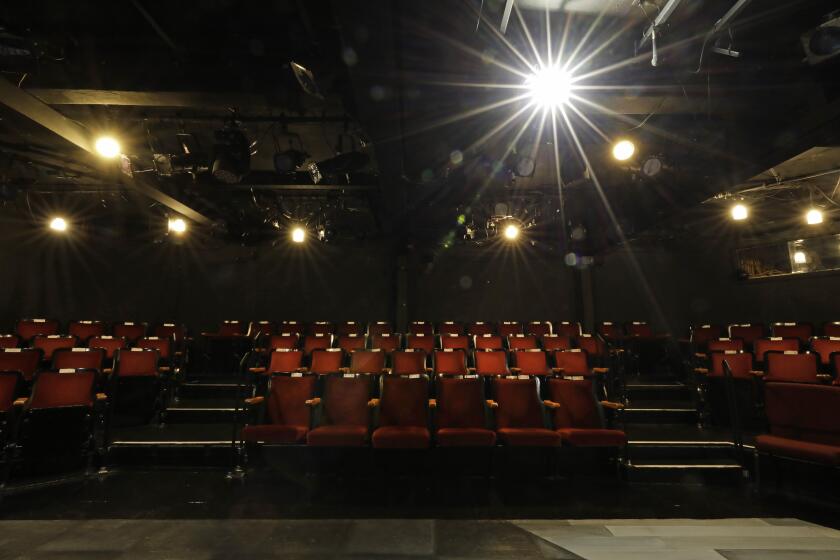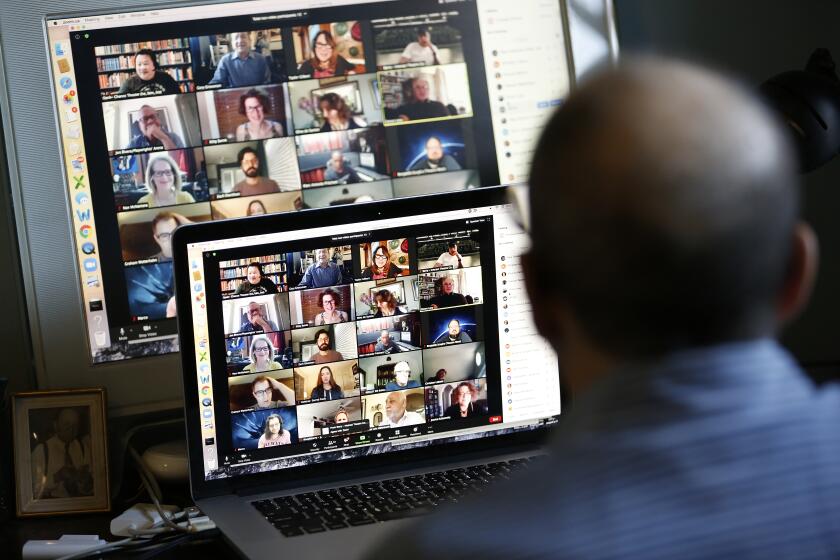Review: Black life in California, potent and poetic on Pasadena Playhouse’s virtual stage
- Share via
The historic Pasadena Playhouse is empty. No ticket holders gossiping and rubbing elbows in the Spanish Revival-style courtyard. No line at the bar.
In the auditorium, the aisles are free of bodies waiting to take their seats. Still, lights shine down on the bare stage, spilling out into the unoccupied rows, glinting off the dust motes that hang in the air.
A man steps out, wearing a T-shirt and jeans: Javon Johnson. He’s the star of the show, the writer and performer of “Still.,” a work of spoken-word poetry commissioned by the playhouse and streaming now on its new digital platform, PlayhouseLive.
No one claps.
The economic devastation of the pandemic is taking a profound toll on L.A.’s small theaters. Camaraderie, and action, are easing the pain.
Johnson is up there all by himself. Well, his director, Donny Jackson, is most likely around, behind the scenes. And there must be a camera crew, filming Johnson from different angles, closing in on his face as he addresses the ranks of empty seats, delivering poems about his family and his past and his future, about growing up as a Black boy in California and about his hopes and fears for his unborn daughter, due to begin her life in a pandemic.
If you didn’t know that Johnson emerged from the spoken-word poetry scene and was a three-time national poetry-slam champion (he also is assistant professor and director of African American and African diaspora studies at the University of Nevada, Las Vegas), you might not immediately recognize what he’s doing as poetry.
At first he just seems to be talking, eloquently, extemporaneously. His vernacular is casual, his tone ranging unpredictably from rage to tenderness, mourning to mischief. Only gradually do you become attuned to the lyricism of his language, as well as the meticulous structure of his stories. It’ll sneak up on you. He specializes in the unexpected connection, drawing analogies between words and concepts that seem irreconcilable until suddenly, in a final word or pause, he snaps them into place. He compares grammatical sentences to prison sentences, cancer in a human body to the gentrification of Oakland, Freddy Krueger to the American criminal justice system. Sometimes you don’t think he’ll pull it off, and then he does.
“Still.,” commissioned as a response to the killing of George Floyd in May, is inevitably full of rage. It’s also full of hope. Revealing much more might reveal too much of a show that runs less than an hour, but suffice it to say that a live audience would probably laugh a lot during Johnson’s performance. He has a way of lightening a tense moment with a joke. But there’s no audience. The camera keeps reminding us of its absence, panning across the empty seats.
It’s such a potent symbol, an empty theater: Is this the apocalypse? Or only a pause between acts? We’ve been asking since March. Will theater return? If not, what do we do with the stuff we’ve collected over the centuries? The scripts. The wigs. The follow-spots. The proscenium stages. The curtains. The people with things they want to say. In person. To other people.
The COVID-19 shutdown spurs the creation of Alternative Theatre Los Angeles, whose virtual festival runs for three weekends.
They’re not giving up without a fight: PlayhouseLive is one of several digital platforms recently launched by L.A. theaters. (Center Theatre Group just unveiled the Digital Stage.)
Some of their fledgling offerings — whether they’re previously recorded works or new pieces designed for the online medium — likely won’t work, if the wave of streaming theater so far is any indication. It’s hard to figure out what these productions are supposed to be: Live performance, but canned? Filmed movies, but slower, without as many camera angles and special effects?
For me, “Still.” is a knockout punch because it reflects this moment in time so honestly. This in-between life that may turn out to be an aberration but may stick. Our lively theater scene has gone still; we can’t duplicate it. On the other hand, we’re still here.
Johnson ends with the irresistible, celebratory “Black and Happy,” in which he shares his delight in the rituals and fellowship of the Black community: “You cannot kill Blackness,” he proclaims. “Too much of it is wrapped in an unshakable joy.” We can hope the same is true of the human spirit, and of the theater.
'Still.'
When: Available through Nov. 1
Pay-per-view fee: $19.99 (There is an additional fee for the PlayhouseLive membership to access to other content on the platform)
How: Rent through PlayhouseLive.org. After purchase, “Still.” can be watched on phones, tablets and TV through iPhone and Android apps, Apple TV, Roku, Amazon Fire TV, Chromecast and more. Closed captioning available in English and Spanish.
Running time: 42 minutes
More to Read
The biggest entertainment stories
Get our big stories about Hollywood, film, television, music, arts, culture and more right in your inbox as soon as they publish.
You may occasionally receive promotional content from the Los Angeles Times.












